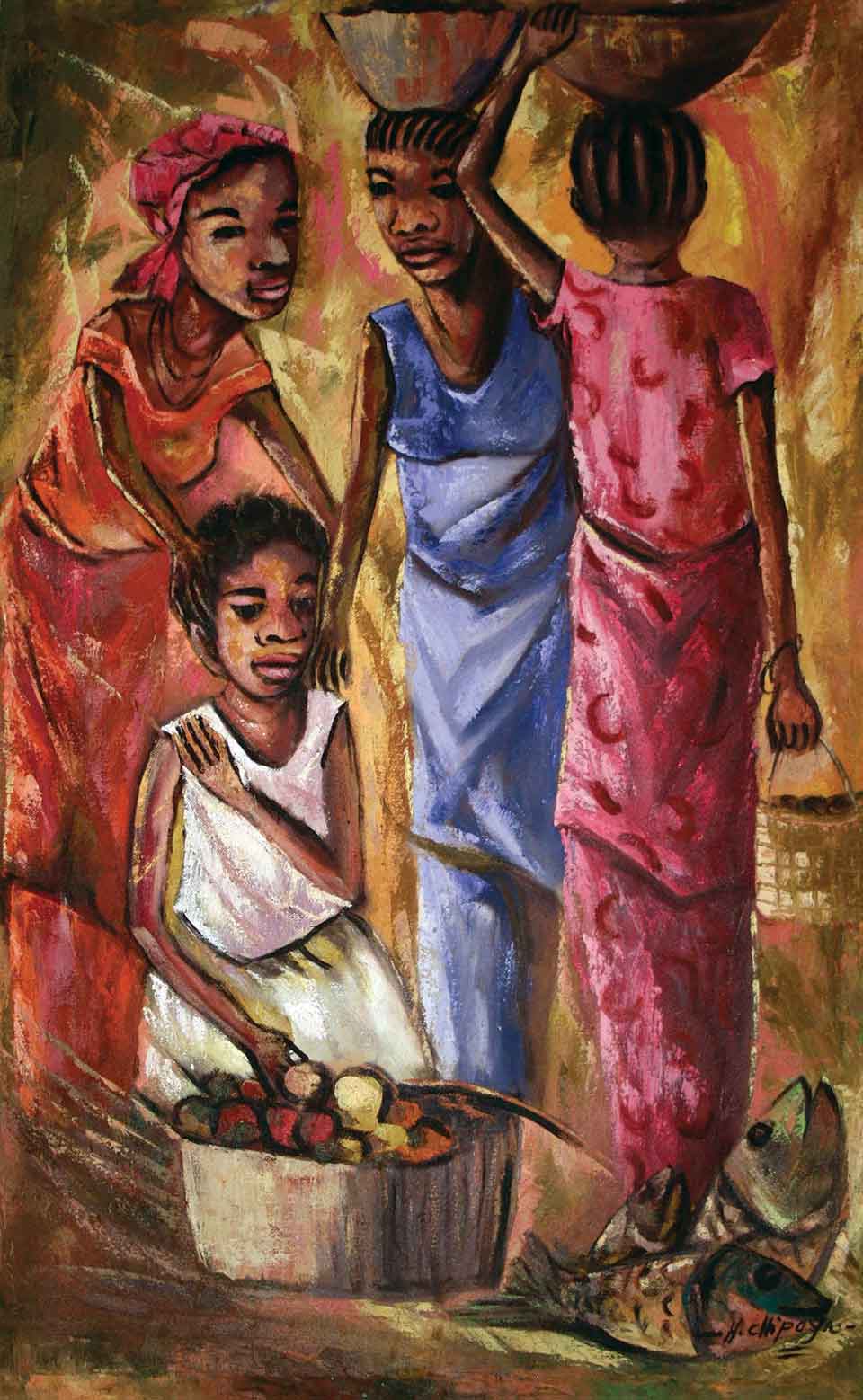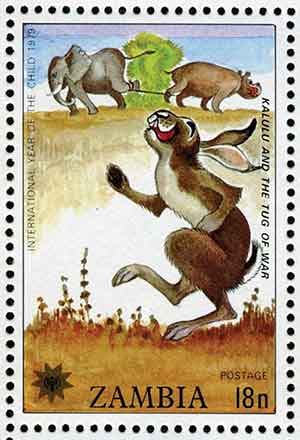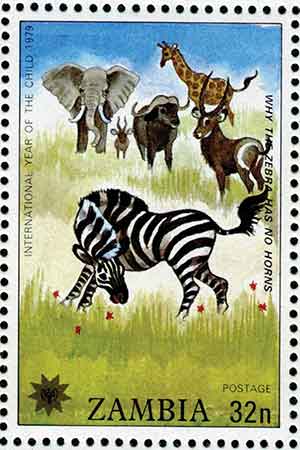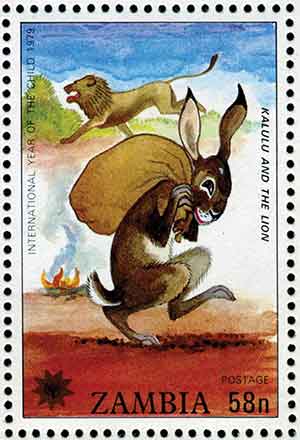Four Trickster Tales from Lwapula Province, Zambia

The Aushi are an ethnolinguistic group located in the Lwapula Province of the Republic of Zambia and in the Katanga Province in the Democratic Republic of the Congo. The following tales were recounted and shared collectively by a group of women who wish to be identified by name: Agnes Kaunda Chiwamine, Rosemary Mushota, Scolastica Kalengule Chiwamine, Exildah Mwansa Musoka, and Sarah Mweba.

Rabbit Destroys a Friendship
Once upon a time, people lived peacefully in the chiefdom. Hippo and Elephant had a healthy friendship—heck, they even used to play together! That was all before Rabbit, though . . .
Rabbit went to his uncle and asked, “Uncle, uncle, have you worked well with this one, with Elephant?” After he got his answer, Rabbit returned to where Hippo was.
“Hippo, as for me, I am truly suffering a lot. You see, my drum, which I like to beat, is stuck in the mud.”
“Wow, Rabbit! How can your drum be stuck in the mud? Okay, no problem. Pick a day, and I will come to remove it. I will come to remove that drum in the mud where it is surely stuck in the riverbank.”
Then Rabbit went to Elephant and said, “Uncle, as for me, I am suffering so very much, and I don’t know what to do.”
Elephant asked, “What do you want?” Rabbit replied despondently, “Well, my drum is stuck in the mud . . .”
“And? What do you expect to happen?”
“I was hoping you might come and pull it, well, remove it for me.”
So, he picked a day. He picked a day and said, “We are going to meet. We are going to pull it out on Saturday.”
Rabbit went to where Hippo was and said, “This drum, hey, this drum, I’ll come and remove it for you. Let’s set the day on Saturday around ten o’clock. When you hear me beating it, then you will start to pull. Elephant also was there. Rabbit went to where Elephant was on the hill.
“Uncle, around eleven o’clock I want you to come and remove the drum for me.”
“When you hear me beating the drum, then you will start to pull it in your direction.”
“I don’t even have anything to do.”
Elephant went there around ten o’clock. He was stopped a short distance before reaching. Wa wa wa wa! Hippo splashed into the water there. Po po po!
Arriving where Hippo was, Rabbit jumped and said, “Uncle, stop over there. I will tie, I will tie you. When I have finished tying you, I will sound the drum. Then you can start pulling.” From there, he went to Elephant and said, “Uncle, when you hear me sounding the drum, you can start to pull this rope.” He had a very big, sufficiently long rope. He tied Elephant at the trunk, and he tied Hippo at the neck.
Then he went to the middle of the river to sit on the drum where he had put it earlier. From there, neither Hippo nor Elephant could be seen. Then he sounded the drum. Mpiii! Once Hippo heard this, he started to pull, saying, “Let me remove this. Let me remove the drum for my nephew.” Elephant, too, heard the drum and said, “Let me remove the drum for my nephew.” They started to pull in their own directions; thus, Hippo and Elephant were pulling each other.
Now, Hippo refuses to budge when he is being pulled. Why? Well, because he doesn’t want to be outside of the water, he is using incredible energy! On the other hand, Elephant is pulling with an enviable strength and refuses to stay in the water. Although he’s tired and falling down, falling down, pulling trees, falling down, Elephant ties himself to a tree for support. And Hippo? As he pulls, trees were collapsing toward the ground—scattered and broken.
Hippo pulled Elephant into the water, and Hippo became powerful there in the mud at the bottom. Elephant pulled Hippo out of the water, and Elephant became powerful there on the ground. Despite starting around ten o’clock, eleven o’clock, twelve o’clock, and six o’clock also came. They continued until the evening when they became exhausted. Hippo and Elephant were both exhausted.
They both started exclaiming from their corners, “The drum, it is coming. No, it is stuck. Let me get closer, just come a bit closer.” Both Elephant and Hippo approached the drum and exclaimed, “Let me see this drum that cannot be removed from the mud.” They saw not only the drum but each other! They cut the rope and vowed then and there never to play together again. In fact, they exchanged words of hatred, not realizing in the heat of the moment that he who caused them to become enemies was Rabbit.
After a few minutes passed, they cut the rope and both looked toward Rabbit, who entered the bush. Kilwa kilwa kilwa kilwa! He ran for his life and disappeared into the grass.
 Rabbit, the Leaking Well, and a Marriage
Rabbit, the Leaking Well, and a Marriage
Once upon a time, people lived just like we live. And they even spoke Aushi, just like we do! There was a village, a village that had a chief who had a young daughter. He proclaimed to the residents that “He who can close the well—to stop the water from returning to the ground—can marry my daughter. He will be rewarded with marriage to the daughter of the chief. Upon finishing this task, this will be his reward.”
So, the well had an opening, an opening into the ground. If there is an opening, it will burst right at that very spot! The young men of the village went to the well.
“Are you the ones who have come to fix the well?”
“Yes, it is we who have come to stop the water from draining.”
“Who is going to be the first to try?”
One of the young men answered, “Me.” And so their friend entered to patch the hole. He was cleaning it, cleaning it, cleaning it. Just like that, the water was going to continue to drain. The man sadly said, “I have failed to fix the well.” Then another one of his friends attempted the same task. And what happened? They all failed miserably.
Then Rabbit appeared, saying, “I will enter the well, myself. Chief, you are going to see the exact moment when I fix the well.” Then he entered and worked harder than he had ever worked before. He stepped precisely where the water was draining. He broke something and stuck it where the water was leaking. He was stepping and smushing and crushing and smashing it in the hole. And just like that, the water stopped! The hole was smeared shut by Rabbit’s foot.
Although out of breath, Rabbit exclaimed, “Hey, Chief, give me my girl.” It was at that moment that the chief was shocked. In fact, everyone was shocked, but they gave him the girl’s hand in marriage. That was the day that Rabbit got married, and a large celebration followed.
Little did they know, Rabbit was the one who made the hole in the well that caused all of the commotion in the first place!

Chief Lion, Rabbit, and the Ikilundu
Once upon a time, people had been living in the chiefdom of Chief Lion. They founded a village there that grew to be quite large. One day Chief Lion said, “I want someone who can make me an ikilundu.” Rabbit heard and said, “Yes, an ikilundu. One will be made for you.”
He went and sat in the bush to make it. After he finished making it, however, he went to Chief Lion, and the conversation took an unexpected turn.
“I have finished your ikilundu.”
“You have finished making it?”
“Yes, but it has been stolen by Antelope.”
“Wait, stolen? Antelope is the one who took my ikilundu?”
“Yes, and you will see him when he arrives!”
So, Lion stayed there and started investigating the ubwinanama, the place where different animals gathered together. He wasted no time and started asking, “Who has my ikilundu? Who is the one who has taken my ikilundu? Who has taken it? Who has taken it?”
However, Rabbit was trying it on earlier that very day, despite knowing that it belonged to Lion. He looked toward Lion and repeated again, “Lord, I made the ikilundu, but Antelope has taken it. In fact, Antelope even told me that he is the chief here. What are you going to do? What would you have us do?”
Now the rest of the animals became concerned, saying, “Chief Lion, what is needed here? You are the chief here. Call out to all of the people in your chiefdom. The one you see putting on your ikilundu is the one who has stolen it and the one who has also tried to take your power!”
And that’s exactly what the chief did. “Tell the guards to announce this message: Everyone is required to come here. Go to every different part of the chiefdom and tell them that every resident needs to come here to the palace.”
So, Rabbit went to Antelope and asked, “Uncle, have you heard the news that every resident must go see Lion?” He replied, “Yes, but I haven’t gotten dressed yet. I look terrible!” Rabbit said, “Well, yes, you aren’t quite ready, but I have a really nice ikilundu that you can wear. You would look fantastic!” Not knowing the true circumstances and speaking strictly out of appreciation, Antelope responded, “Oh, how kind you are to me!” Thus, Rabbit took the ikilundu he made for the chief and helped Antelope get dressed. They started traveling, traveling, traveling to where Lion was.
But, listener, remember that Lion was already warned that he who puts on the ikilundu claims to be the chief, even going as far to say, “I am the great chief! That Lion is nothing.”
The two were seated upon arrival. Lion started looking around. He looked out into the crowd, into the crowd, into the crowd, and suddenly he recognized the ikilundu. He recalled what Rabbit had told him. Still, he held the meeting and said, “Truly, there is someone here in my chiefdom who claims to be above me. Who dares claims to be the chief? It must be that one in my ikilundu, over there!” The audience saw that he was pointing and looking in the direction of Antelope, to the place where he was seated, to the place where the ikilundu was, to the place where the imposter was.
Rabbit started getting closer to where Antelope was and called out, “You, Chief Lion, don’t go any further. The person is this one!” The guards quickly ran there to arrest Antelope, who cried out immediately, “Let me explain! Let me defend myself!” They grabbed him and tied him up. All Antelope wanted to do was confess that it was Rabbit who had given it to him, that he had not actually stolen it. However, Rabbit quickly inched closer and squeezed Antelope’s throat. Usuu! He spat saliva upon his face, but a slave dies with words in his mouth! Nomba umusha aafwa nefyebo mu kanwa!
So, this is how they came to arrest Antelope, and they killed him soon hereafter. They killed him for Chief Lion. He died for something he did not do. He was killed for no reason. And this is how the story ends.
 Dirty Water, Tortoise, and the End of Rabbit
Dirty Water, Tortoise, and the End of Rabbit
All the animals lived in the chiefdom, and the ubwinanama is where they were found. However, these animals had nowhere to draw water. They had no place from which to drink water. This included all the different types of animals, such as the elephants, antelopes, fire ants, gazelles, little rabbits, and tortoises. They held a meeting, and this meeting took place with one real issue to discuss: “We, the animals, are suffering very much without a place to get our water. Let’s dig a well, so that we can drink water.”
All the animals agreed and said, “Yes, let’s dig the well from which to drink water.” Rabbit said, “Ha! Me? I won’t dig a well.” They asked, “Rabbit, are you really refusing to dig the well, refusing to help us?” Rabbit replied, “No, as I said, I am not going to the dig the well.” So, all the other animals gathered and started digging the well—digging, digging, digging, digging, just digging the well until it had grown to a large size and yielded water.
All the animals started wandering into the bush. As they came back, one by one they started drinking. One sat and drank, another sat and drank, and another sat and drank. They drank from the well until they were satisfied. At that very moment, Rabbit was observing and noticed that they placed guards there to look after the well. They put those people there who would guard the well.
Before they put the guards there, all the animals would simply go there to take care of their needs. Rabbit, too, would go there to drink water and to bathe; however, he would bathe and dirty the water. He would make it filthy. When the other animals would return, they would find that the water had become dirty, that their drinking water had been dirtied. They would proclaim, “Who has dirtied our water? In the old days, we just used to drink directly from the well without any issue.”
It so happens that that night was when things changed, as Rabbit would come to where the well was in order to drink water. In fact, this was the same well he refused to dig. Still, he would drink, drink, drink, drink the water. Once he had his fill, he would start cleaning his body and immediately dirty the water. Yes, it was he who was dirtying the water—and the other animals would only realize it again the following morning.
“We are drinking dirty water! We need to find out who is dirtying the water at the well each night. Who can we have look after the water?” One shouted out, “Choose Antelope!” It was then that Antelope became the one who would remain to look after the water, to look after the water in the well. So, who did Rabbit find the following morning when he went there? Antelope, of course!
“Uncle Antelope, how are you? Are you well?” He replied that everything was fine. “Oh, okay! Uncle, look at your fur. Your fur is not looking very nice. If it needs to be plaited, I can definitely do it for you. In fact, when I plait your fur, they will definitely praise you even if you are in a crowd with others!” Antelope agreed to this, and Rabbit pulled ropes out of his pocket. He started tying up Antelope and said, “Come here to this tree. I’m plaiting your fur very nicely.” Antelope went closer to the tree, and Rabbit started tying him to the tree with the ropes. Oblivious to what was happening, Antelope simply asked, “How does it look? Is my fur looking nicer?” Rabbit replied affirmatively and said, “Yes, it looks nice. I’m plaiting you very well, Uncle.” Soon enough, he finished tying the ropes and closed them off in knots. “First, do like this, Uncle. Do like this—try to shake.” Antelope tried to shake but realized he was tied up and stuck.
Then Rabbit went to the water. He drank and bathed and drank and bathed and dirtied the water. As Antelope protested, Rabbit went to pick up a stick and started whipping him. He whipped him terribly with the stick and left him swollen and crying while Rabbit simply walked away. When all the other animals arrived, they found that the water was dirtied and that Antelope was tied up. “What has happened here?” they exclaimed. He replied, “It was Rabbit! It was Rabbit who tied me up!” The animals looked back with incredulity and said, “You? He tied you up? But you’re a grown-up!” Antelope replied despondently, “Yes, he tied me up. What should we do now?”
They all kept quiet until one asked, “Who here is much more clever than Rabbit? Who can we choose? How clever is this Rabbit! What are we going to do to be able to have water? You see, Rabbit refused to dig the well, but now he is destroying our water. So, we need to choose someone large. Is there someone here who can catch Rabbit? Oh, let’s choose Elephant!”
He left the following morning to look after the well—to ensure that the well would stay safe. He would keep the water clean. He was observing his surroundings, and then Rabbit arrived around seven o’clock. Rabbit demonstrated great respect toward Elephant and asked, “Uncle! Uncle, how are you this morning?” But Elephant realized that it was Rabbit who dirtied the water, who spits at people, who manipulates others. Still, Rabbit asked, “Uncle, have you come to drink some water? Please, come and drink.” Rabbit started drinking the water, and Elephant came alongside him and dropped his trunk—yatiiiii! He told Rabbit, “You have troubled us very much, so today is your death.” Rabbit replied, “But Uncle, it’s just me. If you insist, then do not throw me on the stones. If you throw me there, then I will not die. Look over there where there is sand. If you throw me on the sand, then that is certainly my death.” Elephant heard this, looked where there was sand, and threw him on the sand. In this way, Rabbit was able to escape and go into hiding.
All the other animals returned, and what did they find? They found Elephant saying, “Rabbit is gone. I caught him and threw him on the sand over there, but he has now gone and I don’t know where.” Tortoise stood up proudly and said, “I will catch Rabbit!” The other animals looked back and laughed. “You, Tortoise? It will be you who will catch Rabbit? All of the other animals have failed. Antelope failed. Elephant failed. All the animals have failed, but you are the one who can catch Rabbit?” He replied with confidence: “Yes, it is I who will catch Rabbit.” The incredulity of the other animals continued: “How are you going to catch him? By what means?” Once again, Tortoise replied, “I will catch Rabbit today.”
They sat somewhat quieter than usual but still asked, “Now, what are we going to do? Is Tortoise really going to catch him?” Then Tortoise started to give them advice. He said, “Find me some bark. Find me a very large piece of bark. When you find it, then pierce a hole in it, and place me inside that very piece of bark.” And that’s exactly what they did in the morning: Tortoise came, they pierced the bark, and they placed him inside.
All the animals left. All the animals had gone. Rabbit came out and was looking around in every nook and cranny, but there was no person nor animal here. So, he took the water and drank and bathed, drank and bathed, drank and bathed. The bark where Tortoise was hiding felt nice like a chair. Rabbit said, “Let me wait for the others. They will come and find me here. I will sit on the bark over there where it’s nice and sunny.”
He didn’t realize who was beneath the bark, but Tortoise felt that someone was sitting on top. He carefully reached out from the bark with his nail and slowly hooked Rabbit. He hooked him right at his butt. Rabbit didn’t realize it and said, “Well, I guess it’s time. I’m going to leave now.” He heard the other animals as they came closer, and then he reaffirmed his commitment, “Yes, I am leaving.” He tried to leave, but the bark was strong. He started jumping uncontrollably, but he could not break free. The other animals looked on from a distance and said, “Look! Rabbit has been grabbed by Tortoise right there.” As they came closer, they found that Tortoise had indeed caught Rabbit and that the water was dirtied.
They looked at Rabbit and proclaimed, “So clever! You think you are so clever, but today you have been caught by Tortoise.” And that’s how they arrested Rabbit. Each of the animals ate a piece of his flesh. This one took a leg, and that one took a leg. That’s how Rabbit met his maker, and that’s where this story ends.
Translations from the Ikyaushi
Editorial note: The preceding tales were collected during two consecutive fieldwork trips in 2018/2019 to the villages of Matanda, Mansa, Kabunda, and Mabumba in Zambia’s Lwapula Province. All the texts were recorded, transcribed, glossed, and translated. Additional contextualization of these tales can be found at www.troyspier.com.











